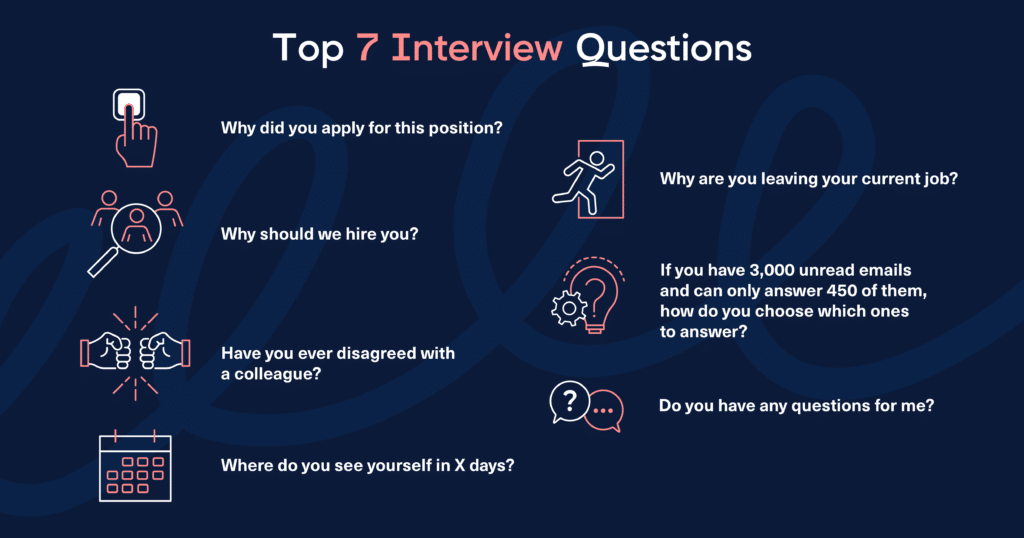When it comes to interviewing candidates, there are a thousand questions you can ask them, from what kind of tree they’d be to how they define hard work. But which questions are the most useful?
Hiring someone new is a big decision that can either drive your company forward or hold it back, so you want to find the best possible person. Unfortunately, it’s impossible to learn everything about a candidate by just asking them a series of interview questions.
The good news is that you can find out everything you need to know by asking good interview questions. In this article, we’ll break down seven of the best questions to ask in an interview, why they’re important, and what sort of answers you should look out for:

- What do you know about our company, and why did you apply for this position?
Asking these questions will allow you to see which applicants have done their homework. You’ll be able to differentiate applicants who are truly motivated to work with your company in the role they applied for from applicants who indiscriminately applied to countless jobs with a click of their mouse or didn’t bother preparing for the interview.
Often, the best candidates are those who cite an interest in something your company is already doing or has in the works, as motivated employees will likely stay longer, be happier, and work harder than those who are only motivated by their paycheck. For example, someone looking for additional responsibility and a fast-moving environment might be ideal if your company is in the process of expanding and signing on new customers.
- Why should we hire you?
This question is an interview staple — and with good reason! It’s an opportunity for your candidate to share what they bring to the table.
Some candidates might list concrete skills that directly relate to the job, while others might bring up something less tangible, such as their work ethic. Neither type of answer is inherently better than the other, but the best ones showcase a candidate’s ability to do the work required of them, fit into your team, and bring value to the company.
You’ll also want to note how your candidate answers this question to gain insight into their personality and confidence levels. For example, did they seem arrogant, or did they struggle to come up with an answer?
- Have you ever disagreed with a boss or colleague? What did you do?
Asking this question will help you understand how your applicant resolves conflicts and navigates professional relationships. In addition to learning what the disagreement was about, you’ll want to pay attention to:
- Your applicant’s tone: The way a person talks about someone who isn’t in the room says a lot about their character and professionalism.
- Whether they’re blaming the other person: You want employees who take action to resolve problems, not employees who play the blame game.
- How they handled the situation: Finding common ground with a boss or colleague during a disagreement is a strong indicator of emotional intelligence.
- Where do you see yourself in 30 days? 60 days? 90 days? 5 years?
Hearing what candidates expect to be doing in these time frames will help you find those who are motivated, ambitious, and have seriously considered a future with your company. It can also help you find candidates who are ready to hit the ground running and whose long-term professional goals align with what your company offers.
The best candidates will discuss how they’ll familiarize themselves with your company in the beginning. They’ll then dive into concrete ways they can help drive the company forward and how they will advance their career within the company.
- Why are you leaving your job?
You can read between the lines to see what candidates want to get out of their new job. For example, if a candidate is leaving because they didn’t receive enough mentorship or room for advancement, you can showcase that your company offers opportunities for professional development.
This question can also help you eliminate candidates:
- With unrealistic expectations
- Who play the victim or badmouth their previous employer
- Who believe they already know all there is to know (spoiler: there’s almost always something more to learn)
- If you have 3,000 unread emails and can only answer 450 of them, how do you choose which ones to answer?
The point of asking this question is to gain insight into your candidate’s verbal communication skills and how they tackle problems and prioritize overwhelming tasks, so their actual answer doesn’t matter. What matters is their reasoning.
You want to look for candidates who have a clear logic behind their thought process and can effectively articulate which emails they would prioritize and why.
- Do you have any questions for me?
Most interviewers use this question to wrap up interviews, and you should expect at least one question. (It’s not always a trick question — if you’ve already had a long, detailed discussion, it’s okay if your candidate doesn’t have any questions!)
Not only does this question allow candidates to further explore any areas of interest, but it also gives you the chance to identify which candidates are most passionate about the position. Look for thoughtful questions that show your candidate was really listening during the interview or has conducted external research on your company.
Start Recruiting With Betterleap
If you’re looking to 10x your productivity as a recruiter, sign up for Betterleap! Betterleap is an AI-powered outbound recruiting platform that seamlessly connects everyone involved in the recruiting process. Everyone from internal recruiters and hiring managers to the recruiting firms, contractors and VC firms can connect on Betterleap to source, engage and convert candidates for open roles. With one workspace for all outreach activity, recruiters can make data-driven decisions about how to best optimize their time and hire with more efficiency.




